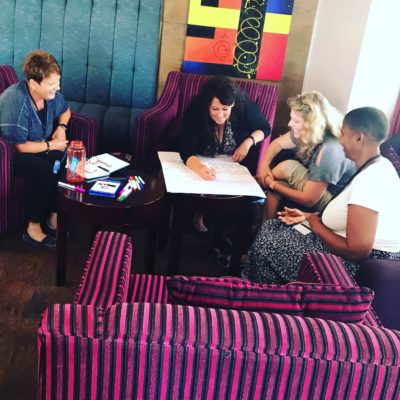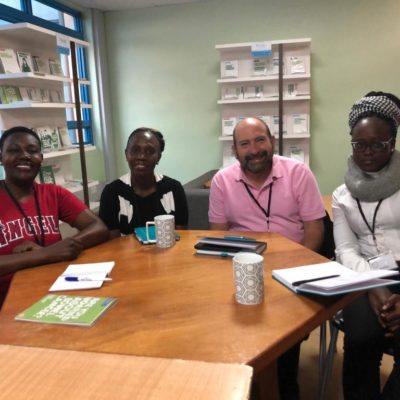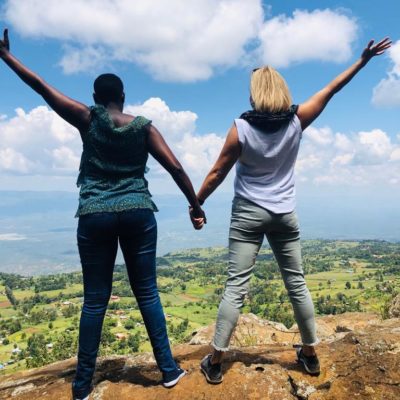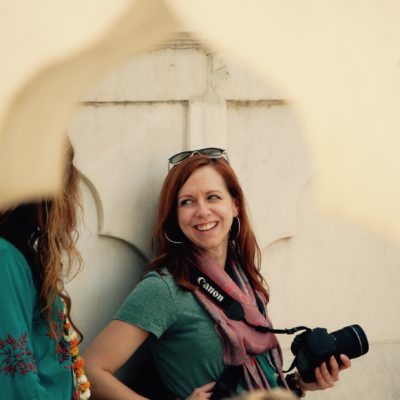Our Next Chapter: Launching the Global Emerging Leaders Program
In September 2019, A Fresh Chapter launched its pilot Global Emerging Leader Program in Kenya. 6 U.S. cancer advocates, 6 Kenyan cancer advocates, and 6 Eli Lilly and Company employees came together for immersive leadership development and volunteer fellowship programming that laid the groundwork for expanded work in Kenya. Working alongside local leaders and NGOs, AFC will help end cancer stigma in the country by empowering cancer survivors to heal the emotional scars of the disease and share their stories.
Terri Wingham, founder, and CEO shares more on this new chapter for AFC.
1. This trip to Kenya was the first of its kind, the pilot Global Emerging Leaders Program. What made this trip is different from AFC’s traditional Odyssey programs?
 AFC has typically offered six-month online programs with a two-week international volunteer travel component to help North Americans impacted by cancer heal the emotional scars of the disease while volunteering in communities at home and abroad. As we scale our programs, it’s important to us that we are not only serving North Americans with the tools and resources we have developed, but we’re also creating culturally relevant tools to empower cancer patients and survivors in other countries.
AFC has typically offered six-month online programs with a two-week international volunteer travel component to help North Americans impacted by cancer heal the emotional scars of the disease while volunteering in communities at home and abroad. As we scale our programs, it’s important to us that we are not only serving North Americans with the tools and resources we have developed, but we’re also creating culturally relevant tools to empower cancer patients and survivors in other countries.
This new program brought together local Kenyan survivors/emerging advocates with U.S.-based cancer advocates and skilled volunteers of Eli Lilly and Company for the first cross-cultural immersive experience of its kind. Together our participants not only served the community through awareness events and volunteering, but they learned new leadership and storytelling skills and shared invaluable insights that will make it possible for us to adapt our resources for a Kenya-specific AFC Toolkit. Over the next five years, we will roll out this Toolkit in partnership with our Kenyan alumni to serve patients and their families across the country and ultimately stem the rising epidemic.
2. Can you explain the need for this work in Kenya? What led you to branch out from traditional Odyssey programs and why did you choose to start with Kenya?
 Kenyans are surviving previously fatal communicable diseases thanks to education, medical innovation, and access to care. However, this positive development means that more Kenyans are living long enough to acquire – and die from – cancer when they should be in the prime of their lives. Late diagnosis, shame in seeking treatment, fear of medical results, and low-income status are some of the many contributing factors to this growing epidemic.
Kenyans are surviving previously fatal communicable diseases thanks to education, medical innovation, and access to care. However, this positive development means that more Kenyans are living long enough to acquire – and die from – cancer when they should be in the prime of their lives. Late diagnosis, shame in seeking treatment, fear of medical results, and low-income status are some of the many contributing factors to this growing epidemic.
In Kenya:
- Cancer is the 3rd leading cause of death after infections and cardiovascular diseases
- 70-80% of diagnoses are late-stage due to misdiagnosis and inadequate screening
- ~70% of cancer diagnoses lead to death annually, compared to about 0.16% in the U.S.
In 2017, I met Philip Odiyo Ouma – a psycho-oncologist from Nairobi. He joined AFC’s South Africa Odyssey as a Fellow and immediately saw an opportunity to bring AFC to Kenya and his determination helped spark the vision for this new program. While in Kenya for the pilot program this September, the tremendous need for Kenyans to share their stories was crystallized even further for me. During a cultural event, I spoke to a local performer who asked about our work. When I told her about the program, she couldn’t believe our group had both Kenyan and American cancer survivors. She told me that Kenyans “don’t survive cancer,” and was in shock as I personally introduced her to six of our Kenyan Fellows.
By empowering Kenyans to heal and share their cancer stories, they will become part of a grassroots coalition that supports the work being done in Kenya to end the cancer epidemic. Their personal stories and passion for creating change will eliminate stigma, empower other survivors to become advocates and leaders and contribute to improving outcomes across the country.
3. How is this new program impacting AFC’s goals?
 Through the expansion of our Global Emerging Leaders Program, AFC aims to reach at least 32,000 Kenyans impacted by cancer by 2025. This is only part of our broader vision to scale our tools and resources to activate one million people impacted by cancer globally to become advocates for change by 2025. In addition to expanding our Global Emerging Leaders Program in Kenya and offering our immersive Odyssey programs, we will also roll out new online programming that is both group and self-led so more people impacted by cancer can access the tools, resources, and community to reclaim their lives while serving others.
Through the expansion of our Global Emerging Leaders Program, AFC aims to reach at least 32,000 Kenyans impacted by cancer by 2025. This is only part of our broader vision to scale our tools and resources to activate one million people impacted by cancer globally to become advocates for change by 2025. In addition to expanding our Global Emerging Leaders Program in Kenya and offering our immersive Odyssey programs, we will also roll out new online programming that is both group and self-led so more people impacted by cancer can access the tools, resources, and community to reclaim their lives while serving others.
4. How do you see AFC evolving as you continue to grow the Global Emerging Leaders program alongside Odyssey programs?
AFC will continue to focus on building a deep sense of community among our participants through expanded online, national, and international programming. Our model helps people from all walks of life to heal the emotional scars of cancer and learn new leadership skills.
We want to ensure that the concepts and tools we have developed are not limited only to people who have the means and health to travel internationally. Through the evolution of our online and global model, we will offer expanded programming to people around the world, while simultaneously empowering our growing alumni base to become AFC leaders in their communities. By partnering with local survivors in countries around the world, we will develop culturally relevant tools and resources to serve diverse patient populations – in Kenya and beyond.



No Comments